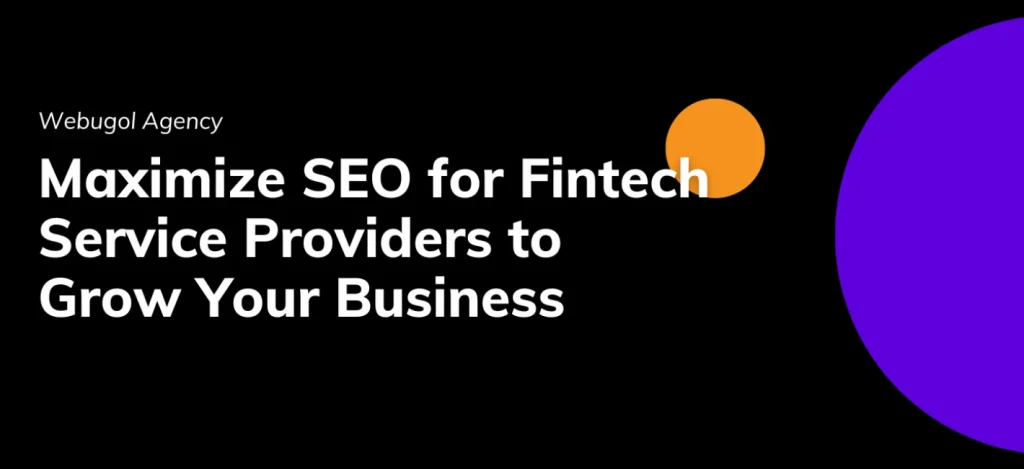The fintech landscape is more competitive than ever. To stand out, you need more than simply a new product. You also need a strong web presence. SEO for fintech service providers is essential to your growth. At Webugol, we’ve seen firsthand how a specialized approach to SEO can transform a fintech company’s visibility, build trust with its audience, and drive sustainable growth.
Fintech companies work in a digital world that is different from others. They must balance strict rules, user trust, and competition from financial giants and agile startups. Today, we’ll discuss how to use SEO strategies that have been optimized for the finance sector. A one-size-fits-all SEO strategy won’t work. It’s crucial to recognize and capitalize on fintech SEO challenges to succeed.

Unique SEO Challenges for Fintech Service Providers
Understanding the problems that make SEO for fintech unique is essential before exploring answers. Fintech marketing has its own set of rules and expectations that are different from those of e-commerce or lifestyle blogs.
- Strict Regulations and Compliance
- Building Trust and Credibility
- High Competition
- Complex and Jargon-Heavy Topics
Due to these challenges, SEO for fintech service providers must be technically competent and connected with trust, authority, and user education.
Effective SEO Strategies for Fintech Service Providers
To get around SEO for fintech, you need to use a variety of methods. Let’s break down the key components of a successful strategy.
1. On-Page SEO
On-page SEO is the process of making the pages of your website better so that they rank higher and get more relevant traffic.
Keyword Research for Search Intent
Go beyond broad terms like “investment app.” Your target audience is asking specific questions. Use tools like Ahrefs or SEMrush to find long-tail keywords that reflect user intent. It’s important to make sure that your SEO for fintech service providers matches the consumer’s needs and concerns.
Optimize Meta Titles and Descriptions
Your meta title and description are your search results page’s initial impression.
Title
Make it compelling and use your main keyword.
Description
Treat it like ad copy. Recap the page’s value and call to action.
Use Clear Header Tags
Use H1, H2, and H3 tags to organize your content in a way that makes sense. Your H1 is the main title of your page. H2s should break up the primary ideas, and H3s can be used for smaller points. This increases user readability and helps search engines understand content hierarchy.
2. Technical SEO
Technical search engine optimization makes sure that search engines can easily crawl and index your website. Trust is key in SEO for fintech for a smooth user experience.
Improve Site Speed
Websites that load slowly annoy visitors. People who use financial sites want them to be quick and dependable. To speed up loading, compress visuals, cache browser data, and reduce code. Use Google’s PageSpeed Insights to diagnose possible issues. A one-second delay can significantly increase your bounce rate.
SEO for Fintech Service Providers: Mobile Optimization
A lot of people who will visit your site will do it from a mobile device. Your website must load quickly and navigate well on small displays. Google’s mobile-first indexing means that the mobile version of your site is what search engine algorithms use to rank it.
Implement Schema Markup
A schema is a kind of code that makes it easier for search engines to interpret your content. FinancialService, Organization, and FAQPage schema types can provide star ratings and FAQ dropdowns to fintech search listings. This can help you get more clicks.
3. Off-Page SEO
Off-page SEO for fintech service providers involves actions taken outside of your own website to impact your rankings. This is all about building authority for fintech.
Build Authoritative Backlinks
A link from a trusted website is like a vote of confidence. Prioritize quality over quantity. Get links from well-known financial news sites (like Bloomberg and Forbes), recognized industry blogs, and educational institutions. Guest posting, creating original research or data studies, and digital PR are effective tactics.
Engage in Fintech Communities
Join industry-specific LinkedIn groups or communities like Reddit’s r/fintech that are related to your industry. Answer questions honestly and share your knowledge without promoting. This makes your SEO for fintech service providers more effective and can bring in traffic from referrals.
Leverage Online Reviews and Social Proof
Positive Trustpilot, G2, or App Store reviews are strong trust signals. Get happy consumers to write reviews. On-site testimonials and customer logos increase credibility as social proof.
4. Content Marketing for Fintech SEO
Content is the most important part of SEO for fintech service providers. It is your main tool for audience education and trust.
Create High-Value Educational Content
Your audience is looking for answers. Write thorough blog posts, tutorials, and white papers that deal with the problems they are having.
Use Case Studies and Success Stories
Show rather than tell. Detailed case studies that show how your service helped a client reach their goals are very effective. They demonstrate your value.
Leverage Video Content and Webinars
Video is a great way to make complex subjects easier to understand. Produce animated explainers or webinars with industry professionals. Webinars are also an excellent option to get new leads.

5. Local SEO for Fintech Service Providers
If your fintech business has physical locations or targets specific geographic areas, local SEO is essential.
Optimize Your Google Business Profile
Make sure your profile is up-to-date and complete, with the right address, phone number, hours, and service categories. Encourage customers to leave reviews.
Build Local Citations
List your business in local and industry directories. Your NAP should be consistent throughout all listings.
Create Location-Specific Content
If you serve more than one area, make sure your site has pages for each location.
6. Measuring the Success of SEO for Fintech Companies
You need to keep an eye on the correct metrics to make sure your hard work is paying off.
Key Performance Indicators (KPIs)
- Organic Traffic: The number of visitors coming from search engines.
- Keyword Search Engine Rankings: Your position in search results for target keywords.
- Conversion Rate: The percentage of organic visitors who complete a desired action (e.g., sign up, request a demo).
- Backlink Profile: The number and quality of websites linking to you.
SEO for Fintech Service Providers: Recommended Tools
- Google Analytics: Important for tracking traffic, user behavior, and conversions.
- Google Search Console: Provides insights into your keyword performance, indexing issues, and click-through rates.
SEMrush or Ahrefs: Great tools for keyword research, competitor analysis, rank tracking, and backlink audits.
The Future of SEO for Fintech

The world of SEO is always changing. It’s really important to stay ahead of the competition.
- Artificial Intelligence: AI is altering content creation and search engines. AI-powered tools can help you find keywords and come up with content ideas. Search engines are also employing AI to better understand what users want.
- Voice Search: Voice search optimization is becoming more important as smart speakers become more common.
- Video Content: Video is still the most popular way to interact with people online. Integrating video into your content strategy is essential for reaching relevant audiences.
Conclusion
Financial services companies that want to be successful in the long term need to have a strong SEO for fintech service providers. You can cut through the noise and reach the clients who need you by building trust, generating great content, and making your site technically optimized.
This journey demands a lot of work, but the benefits – greater exposure, more qualified leads, and more authority for your brand – are clear.
If you want to broaden your fintech brand, implement these strategies. The Webugol team is great at designing custom SEO for fintech that works for the specific problems that the finance industry faces. Contact us today for a consultation, and let’s build your path to the top of the search results!


